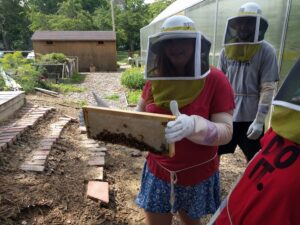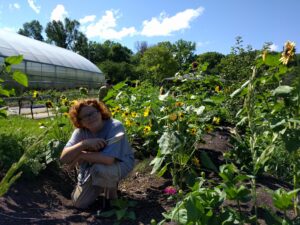Project Overview
Commodities
Practices
- Crop Production: beekeeping, pollination, pollinator health
- Education and Training: youth education
- Farm Business Management: agritourism, farmers' markets/farm stands
- Soil Management: composting
- Sustainable Communities: community services, ethnic differences/cultural and demographic change, food hubs, urban agriculture
Abstract:
 YSC members handling frames from our beehive![/caption] [caption id="attachment_501175" align="alignnone" width="300"]
YSC members handling frames from our beehive![/caption] [caption id="attachment_501175" align="alignnone" width="300"] YSC members posing with our pollinator flower bed in Edible Park![/caption]
YSC members posing with our pollinator flower bed in Edible Park![/caption]
Over the course of the year, Youth Service Corps (YSC) members received hands-on education about honeybee hive management with the help of a local farm/apiary, Bee Wise Farms, LLC. YSC members learned how to handle hive frames, how to react properly with bee swarms, techniques to calm bees down, pests and diseases that can affect hives, how to properly nourish bees and how to safely collect honey, and also got to try several different honeys in order to gain awareness of how local plants and pollen can affect the taste of honey. The overarching benefit of learning about bees and other pollinators for YSC is that it gives a larger understanding of the natural world in the lens of the symbiosis between insect and plant. YSC plants and maintains a large shared urban garden called Edible Park, and understanding the deeper relationship between plants and animals is a key factor in establishing a solid foundation in gardening knowledge, and is very much at the heart of what this project was intended to accomplish.
As a result of our work with Bee Wise Farms, 18 students between the ages of 11-17 got to see first hand the complex inner workings of a beehive. Many of the students reported an increased respect for bees and that they no longer feared stings as much, due to seeing how effective staying calm can be when surrounded. 100% of students surveyed reported that they increased their knowledge of beekeeping, and when asked if knowledge about how plants and pollinators interacted had increased, 100% reported yes. Further, 85% of youth surveyed reported to the positive when asked if their knowledge about honey production increased, and 90% stated that their awareness of other pollinators beyond bees had increased. Moreover, 80% of youth reported increased awareness of pests, problems and diseases facing modern beehives, and 90% of students surveyed said they now possess a deeper awareness of how important pollinators are to agriculture in the U.S. overall.
During the spring and summer, YSC members planted and tended to more flowers than any season previous; focusing on pollinator favorites and anything we had available. Borage was the hit of the season; it was constantly buzzing with bees, and the flowers also became a favorite snack of YSC members as well, once I convinced them that the flavor was actually worth trying. We even made a borage-infused lemonade at our Park Cart stand this year, and it sold quite well.
Looking back on the year, the partnership with Bee Wise Farms was great for YSC and Edible Park in general, and we plan to expand on it in the coming years. Having a hands-on activity involving bugs is usually a hit with kids, and it worked well for YSC. Most of the YSC members already have a good foundation of sustainable agriculture practices and integrated pest management, and adding understanding about pollinator interactions gives them a very well-rounded base of knowledge for urban agriculture.
Project objectives:
Overarching Goal - Youth Service corps members, youth from 11-17 years, will engage in service learning projects focusing on food access in the northeast quadrant of Michigan's capital city. The following objectives were designed to meet the goal:
Objective 1 Construct and Deliver Garden-in-a-Box Kits - Youth constructed and delivered seven Garden-in-a-Box Kits to the homes of neighbors with limited gardening experience, income, and/or mobility.
Objective 2 Continue the Fruit Tree Project - Youth mapped, harvested, and re-distributed fruit from a few fruit trees in private yards in order to minimize food waste.
Objective 3 Expand 'Edible Park'- YSC members expanded the Edible Park (in Hunter Park) by planting lots of ground cherries and strawberry bushes and plants (in lieu of fruit trees), many more flowers than ever before, over 20 perennial herbs, and 50 annual crops. The installation of several Hugelkulture beds was a particularly appealing activity for these youngsters.
Objective 4 Create healthy snacks to sell form the YSC Park Cart at the Allen Farmers Market - YSC Members held 35 sessions in our commercial kitchen, creating healthy snacks to sell at our Farmers Market. Highlights were herb-infused lemonade and ground cherry granola bars.
Objective 5 Learn about Beekeeping at the GardenHouse -The focus of this grant, beekeeping was addressed by having YSC members work with Bee Wise Farms to install, care for, tend and harvest from the YSC hives.